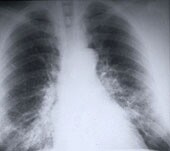
WEDNESDAY, Jan. 13 (HealthDay News) — Advances in genetics and biomarker identification and testing are finally bearing fruit in the battle against lung cancer, a new set of studies suggests.
Until now, lung cancer has lagged behind other malignancies when it comes to identifying molecular features of the disease and developing specific drugs to target those features.
“Lung cancer is a very vexing problem. In the U.S., approximately 200,000 people will be diagnosed this year and the sad part of it is almost as many will die,” said Dr. Roy Herbst, chief of thoracic medical oncology at the University of Texas M. D. Anderson Cancer Center in Houston. “This disease tends to present having already spread, and it’s very heterogenous. If we’re going to make the next hurdle of personalized care, we need to better understand the tumor and use that knowledge to treat patients in more specific, effective and less toxic ways.”
Herbst spoke at a Tuesday news conference that highlighted research being presented this week at a lung cancer conference in Coronado, Calif., being sponsored by the American Association for Cancer Research (AACR) and the International Association for the Study of Lung Cancer (IASLC).
“As we begin to understand the molecular basis for cancer, we’re able to better characterize patients and better able to predict which drugs will or will not work,” added Dr. Jay Brooks, chairman of hematology/oncology at Ochsner Health System in Baton Rouge, La.
Breakthroughs in targeted lung cancer medicine have come only recently, namely with the drugs gefitinib (Iressa) and erlotinib (Tarceva), which aim for the epidermal growth factor receptor (EGFR) gene.
Now, lung cancer scientists are opening the envelope of molecular-based medicine even further.
Here are summaries of five papers being featured at the conference.
- UCLA researchers report that a set of 40 biomarkers in the blood correctly identified patients with lung cancer and patients without lung cancer the vast majority of the time (88 percent and 79 percent, respectively). “Most of the biomarkers had to do with inflammation and other kinds of immunomodulatory approaches,” explained Dr. Matthew Meyerson, a professor of pathology at Harvard Medical School. “This is not intended yet for clinical testing but it shows the potential power of serum-based profiling for early detection of lung cancer.” Early detection, of course, is the key to recovery.
- A panel of 93 genes indicating the presence of EGFR mutations in non-small cell lung cancer (the most common type of lung cancer) predicted which patients have a better prognosis and could benefit from drugs targeting this pathway, scientists from M.D. Anderson Cancer Center at the University of Texas found. “This set of gene expression changes can be useful in determining which patients harbor such mutations which might be sensitive to targeted therapies directed at that particular mutation,” said Tyler Jacks, AACR president and director of the David H. Koch Institute for Integrative Cancer Research at the Massachusetts Institute of Technology in Boston.
- University of Colorado investigators found that patients with non-small cell lung cancer who also had certain configurations of the anaplastic lymphoma kinase (ALK) gene responded better to a new drug which inhibits activity of this gene. About a quarter of patients who took the drug saw their tumors shrink by 20 percent or more, said Dr. Paul A. Bunn Jr., IASLC executive director and the James Dudley chair in cancer research at the University of Colorado. “Some had complete dissolution of the tumor so it couldn’t be seen any more. That almost never happens with chemo,” he noted. Participants had received multiple other treatments before enrolling in the trial.
- Belgian scientists identified three groups of lung tumors based on how they grow and destroy other tissue. Each separate type of behavior correlated with a different prognosis. The researchers are still searching for underlying molecular features that explain the behavior differences, said Dr. David Carbone, the Harold L. Moses chair in cancer research and director of the Specialized Program of Research Excellence in Lung Cancer at Vanderbilt-Ingram Cancer Center.
- Finally, a set of changes in microRNA expression could help determine which patients should be funneled towards conventional chemotherapy and which should receive other types of treatment, researchers from Arizona report. “MicroRNAs are small RNAS that control the expression of many genes,” explained Jacks. “This set of three microRNAs correlated with resistance to therapy. This needs to be validated, but could be useful in diagnosing patients and applying relevant therapies.”
More information
The U.S. National Cancer Institute has more on lung cancer.

